Advantage Naomi
- Oops!Something went wrong.Please try again later.
After more than a year away from tennis, Naomi Osaka is returning to the court. But this time, the four-time Grand Slam champion is a mother, an executive, and more sure of herself than ever before.
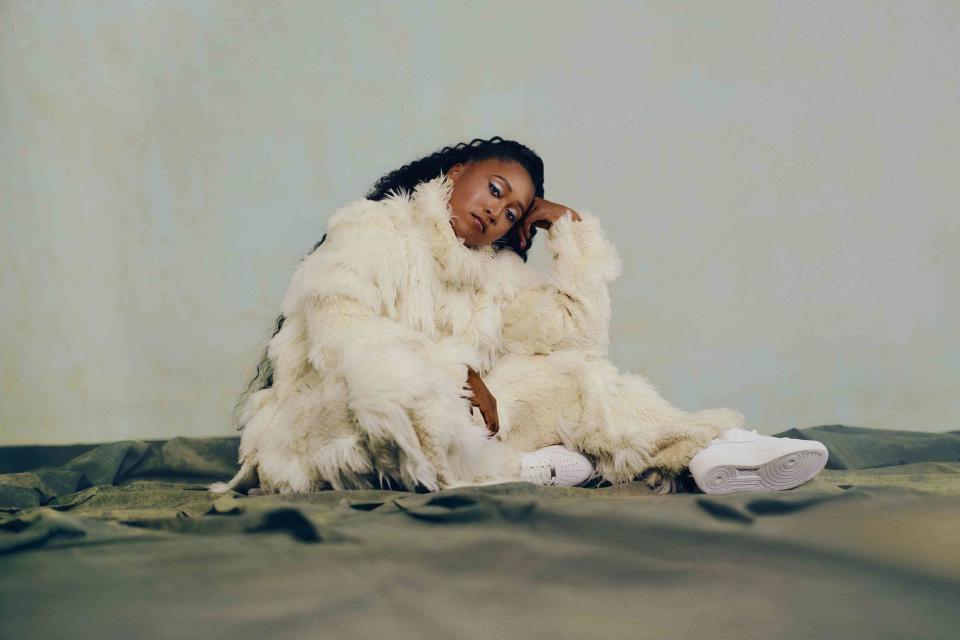
Joshua Kissi
A.Potts top and pants and Nike socks and shoes.Before going into labor with her first child, Naomi Osaka did something that made her uneasy: “I wrote a will,” she tells me, sitting alongside a Los Angeles tennis court shaded by lemon and pomegranate trees. Wearing a purple-blue ombre Nike jersey with “Osaka 97” (her birth year) on the back, the four-time Grand Slam tennis champion has just finished practice. At four months postpartum, and with the holidays on the horizon, she has been training intensely for weeks, preparing to make her comeback at the Brisbane International tournament in Australia over New Years.
Osaka, soft-spoken and admittedly introverted, is the kind of person who believes in releasing her intentions into the universe. She brings that purposeful energy to her game. But when it came to detailing what should happen in the event of her own death, she felt like doing so might inadvertently give that idea imminence. “I always thought if I wrote a will,” she says, “then something might happen to me.”
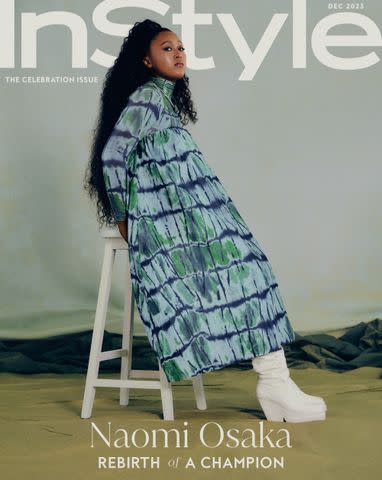
Joshua Kissi
Stella Jean top, dress, and skirt, Cult Gaia necklace, and Gia Borghini boots.Still, her mortality and the health of her unborn child had been weighing on her mind, as her due date crept closer and her body endured the stress of pregnancy. “I don't think people know how hard pregnancy is; no one really talks about it as much,” she says. Morning sickness, weight gain, loneliness. “Going into it, you kind of think: Oh, it's this beautiful journey. But it's kind of rough.”
While pregnant, Osaka tested positive for Group B streptococcus, a bacterial infection that an estimated 20 million pregnant women a year carry and can pass onto their babies. It can lead to a newborn having sepsis or meningitis, or a stillbirth. In the weeks before delivering, she had also been thinking about Tori Bowie, the U.S. Olympic track and field champion, who was found dead two months before Osaka went into labor. An autopsy report determined Bowie was eight months pregnant and appeared to be suffering from respiratory distress and eclampsia, a serious disorder related to high blood pressure during pregnancy. After that news, Osaka admits: “I was kind of starting to freak out a little bit.”
She consulted other moms, including retired 11-time Olympic medalist Allyson Felix, who had been Bowie’s teammate. Felix has spoken out about her own traumatic experience with preeclampsia (similar to eclampsia) during the premature delivery of her child, and how Black women have the highest maternal mortality rate in the nation. Black babies are also more likely to die or be born prematurely. Serena Williams, whom Osaka once called “the biggest force” in tennis, went through a near-death birthing experience, with symptoms that were at first ignored by medical staff.
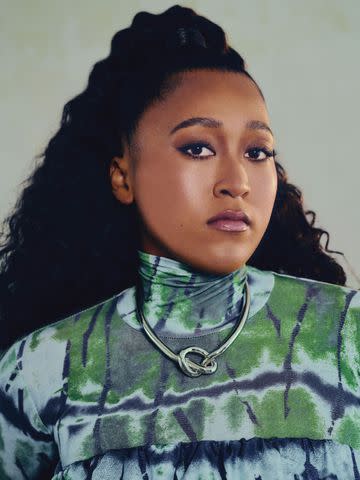
Joshua Kissi
Stella Jean top, dress, and skirt, Cult Gaia necklace.When it came to pregnancy and childbirth, “there were so many things I wasn't aware of,” says Osaka. On the day her water broke, she rushed to the hospital. Concerned about her infection, doctors immediately hooked her up to an IV with antibiotics. After 12 hours, she was only dilated one centimeter. The doctor prescribed Pitocin, which causes the uterus to contract. Osaka had a bad reaction and started throwing up.
As the hours passed, Osaka tried to breathe and focus on having her daughter, telling herself: Whatever happens, happens. It's not something I can control. She had read so many parenting and birth books, but the barrage of advice felt overwhelming. She took a birthing class. None of it fully prepared her.
At some point during labor, doctors told Osaka she had to push her baby out, fast. “I do remember feeling in that moment, This is the worst pain of my life,” Osaka says. “And I know that if I get through this, then everything else will feel very easy.” Osaka would later learn the umbilical cord had been wrapped around her daughter’s neck.
Osaka gave birth in early July to a healthy girl. She and her boyfriend, the 26-year-old rapper Cordae, named their baby Shai, which means “gift” in Hebrew. In the beginning, “there was a huge adjustment period,” Osaka says. “It was life-changing in a day. From the moment that you come back home from the hospital, everything's different.”

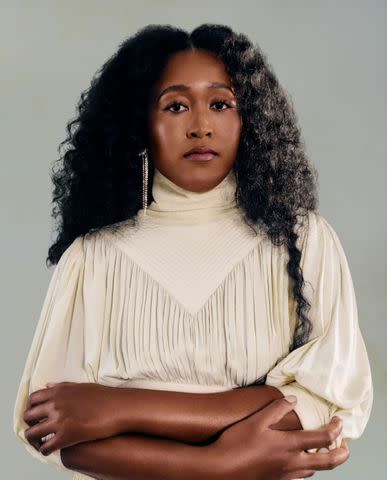
Joshua Kissi
Louis Vuitton dress and Adeam earrings.Mostly, Osaka tells me, she is different. Today, she moves through her tennis strokes and business meetings with a quiet and powerful confidence. Her vibe is sure-footed, deliberate. Everyone around her seems to notice. “She has completely changed since having a baby,” says Carly Duguid, Osaka’s creative director, who manages and directs her fashion, design, and creative businesses, as well as her talent agency, EVOLVE. Duguid has known Osaka since she was 17, and Duguid’s husband, Stuart, is Osaka’s longtime agent and co-founder of EVOLVE. Duguid says it sometimes feels like Osaka is a sister she has watched grow up. One major turning point in Osaka’s coming of age was speaking up about social justice issues, “and not really caring what anybody else had to say about it,” Duguid tells me. “Being a bit fearless and taking a stand for things that she really believes in.”
The other major turning point, Duguid says, has been motherhood. “She's more motivated now than I've ever seen her,” Duguid adds. “I think that has a lot to do with just having your own child, and wanting to excel, and to have someone who looks up to her.”
It was only a couple of years ago when Osaka’s own words, in a three-part Netflix documentary about her life, seemed haunting: “For so long I’ve tied winning to my worth as a person.” Osaka’s sometimes sad-sounding voice played over images of her childhood and tennis career as she asked, “What am I if I’m not a good tennis player?”
In the time during and after filming the series in 2019 and 2020, the world changed along with her. Osaka’s beloved mentor, Los Angeles Lakers basketball player Kobe Bryant, was killed in a helicopter crash, an event that devastated Osaka. During the Covid pandemic, she spent months at home, watching the news reports of rising death tolls and burgeoning social justice movements. She eventually took to the streets marching in Black Lives Matter protests, and when she played in the 2020 US Open, she wore seven face masks bearing the names of Black Americans killed by police.
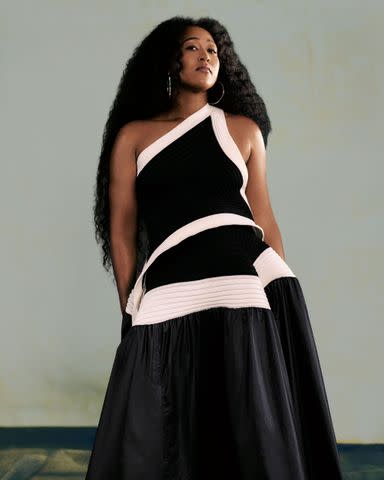
Joshua Kissi
Issey Miyake top and skirt, and stylistâs own earrings.In 2020, Osaka was the highest-paid woman in sports. By May of 2021, she publicly withdrew from the French Open, writing on social media that she had faced “long bouts of depression” since winning the US Open for the first time in 2018. She announced she was taking a break from tennis to focus on her own mental health. “I know where I come from, and I'm so grateful to be here and to be doing the things that I'm doing,” says Osaka, who was born in the city of Osaka, Japan, to a Japanese mother and Haitian father. “But for some reason, I just still felt kind of down in the past years of my life.” Today, “I feel like it's not that way anymore.”
She started competing again in 2022, but struggled with injuries. She last played a match in September 2022 at the Toray Pan Pacific Open in Japan before what would become a 15-month hiatus from the sport. Osaka’s forthcoming return to tennis follows roughly six months of maternity leave. “I’m fortunate to have the support to go back to work on my own terms, in my own time,” Osaka says. “So many American parents don’t have that choice, but we all deserve it. It has definitely motivated me to speak up about the lack of paid leave and to advocate for new moms in this country.”
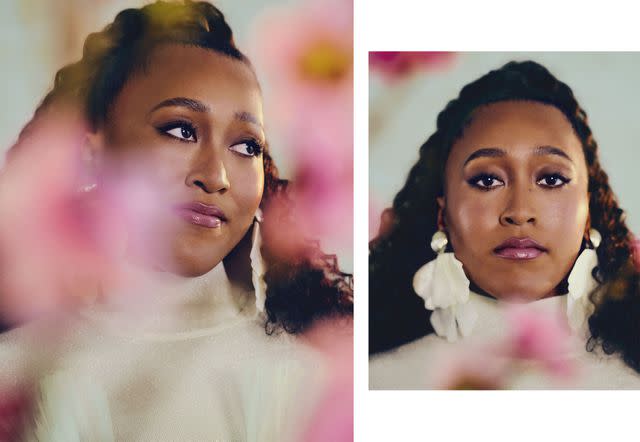
Joshua Kissi
Adeam top and skirt, Fendi turtleneck, and Karo Karu earrings.Osaka used her time away from tennis to reflect and reconnect with herself. Nowadays, in the moments when she is not training, or spending time with Shai or her loved ones, she sketches fashion ideas, hikes, and journals. Osaka tells me she also took up meditating, especially in the sun, which she says gives her a sense of calm and energy, “like it's bringing life into me.”
She has partnered with Modern Health, a global mental health platform, as an investor and advocate. “I just want people to talk about [mental health] and not feel ashamed,” she says. “Normalize it.”
Olympic gold medalist Michael Phelps joined Osaka at a forum on mental health and sports earlier this year, explaining that his own depression began in 2004 after coming off a “high” from the Olympics. He reached a breaking point in 2014: “I didn’t want to be alive,” he said. Phelps thanked Osaka for speaking publicly about her own mental health: “How you composed your words, and posted them on social, to me, it sends chills on my body right now thinking about it. ...I guarantee there are people out there that are reading that,” Phelps told Osaka, “that you saved.” Osaka said that she also had to learn to ask for help, because for so long she was taught athletes have to stick it out and not show weakness. “A lot of athletes were coming up to me and saying thank you,” Osaka tells me. “I felt grateful that I was the vessel to bring attention to that.”
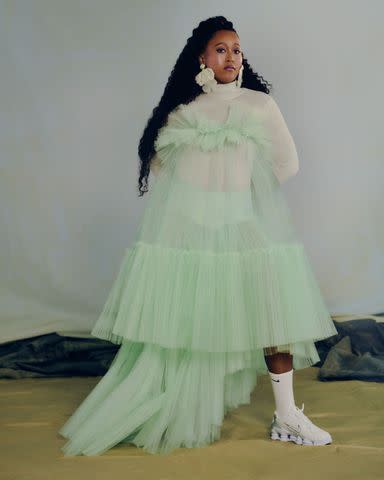
Joshua Kissi
Adeam top and skirt, Fendi turtleneck, Karo Karu earrings, and Nike socks and shoes.Maybe, Osaka tells me, this newfound self-assurance is all part of her own journey into motherhood and maturity. (She turned 26 in October.) Or maybe it grew out of taking a break from a sport that she loves, which she practiced with her father and sister for up to eight hours a day as a kid, homeschooling at night. “I've stepped away from tennis before,” says Osaka, “but this time, it was the longest duration of my life. And I think it kind of gave me a perspective like, Hey, you're not going to play tennis forever. And you kind of have to cherish the years that you can play. I do want to be a good role model for Shai, and I want her to see that this was an important chapter in my life.”
Osaka remains clear about one aspect of her reentry: She will still be playing for champion status. Osaka has won both the US Open and the Australian Open twice, and she has said she wants to win eight more grand slam titles. She is looking forward to playing at the upcoming Wimbledon and French Open tournaments. Osaka lost in the third round of the Tokyo Olympics; she wants to take home a gold medal for Japan in 2024. Her coach, Wim Fissette, who has worked with her on and off since 2019, says he and Osaka started training again in October. “It's not about coming back,” he says. “She really wants to see how good she can possibly be.” Her focus, he adds, is unrivaled.
Osaka tells me she regularly asks Fissette about her return to tennis: “Do you think I'll be good enough?” Fissette tells her she is strong and ready. “But obviously we will have to see where her level is,” he says. “We have to feel it. And from there we have to keep building.”
Her own expectations for herself are higher than ever. “I don't want to come back if I can't play to a certain level.”

Tennis will always be a fundamental part of her, but Osaka’s vision for the future is increasingly multifaceted. It involves nurturing a legacy of businesses that reflect her passions in storytelling, mental health, sports, skin care, and fashion. She sits at the helm of a collection of companies, including Hana Kuma, a multicultural story-driven creative production company, which launched with funding from LeBron James’s SpringHill Company and other investors. Hana Kuma recently created a mental health conversation video series, “Can’t Wait to Hear From You,” hosted by Osaka, as well as an editorial video series, GoodTrouble with Australian tennis player Nick Kyrgios. The shows are available on the Hana Kuma YouTube channel. The company is also behind the short film Footsteps, about youth soccer in Haiti, and it co-produced Mink!, the story of a Japanese-American woman from Hawaii who became the first woman of color elected to the U.S. Congress. Mink!, on which Osaka is credited as an executive producer, was nominated for an Emmy Award. As a child, Osaka loved reading books with medieval themes, as well as anime, and she still enjoys playing video games. Osaka says she hopes to have those forms of storytelling reflected in Hana Kuma.
Then there’s EVOLVE (the aforementioned talent company), as well as KINLÒ, a line of sunscreen and skin care products she launched for melanin-rich skin. In 2020, she opened Play Academy, a youth sports program with hubs in Haiti, Japan, and Los Angeles. Osaka also recently became a co-owner of the Miami Pickleball Club, a professional team that plays in Major League Pickleball. (James and Tom Brady also own teams; the former sparked Osaka’s interest.)
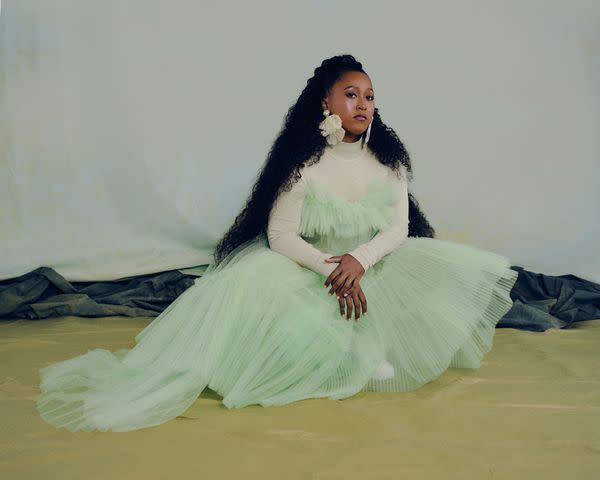
Joshua Kissi
Adeam top and skirt, Fendi turtleneck, Karo Karu earrings, and Nike socks and shoes.Osaka is especially excited by fashion. During the week of our interview, Osaka attended a Lakers game in a black lace-trimmed mini skirt and pinstriped button-down, which she tied at the waist. She held a yellow Louis Vuitton polka dot purse, and tipped the rim of her yellow beaded baseball cap, which read “AMBUSH.” Around her neck, she wore a silver necklace: a bear holding a flower (Hana Kuma means flower and bear, respectively, in Japanese). And on her feet, she donned a pair of purple, gold, green, and silver Louis Vuitton Nike Airs. Osaka is an official ambassador for Louis Vuitton, as well as Nike, through which she recently released a new line of sportswear, including faux fur bucket hats and fleece pants. She has even created her own AI chatbot character, Tamika, for Meta, as well as a separate fashion avatar collection of digital outfits that Osaka designed herself, inspired by her own style and background.
“To have her own fashion brands has always been a dream for her,” Duguid tells me, adding that Osaka’s collaborations have all been intentional. (Her partnerships also include the luxury watch brand TAG Heuer, as well as Victoria’s Secret.) Each one gives Osaka opportunities to learn about design, product manufacturing, and retail sales, “so that when one day she does start her own brand, she already has all this understanding,” says Duguid.
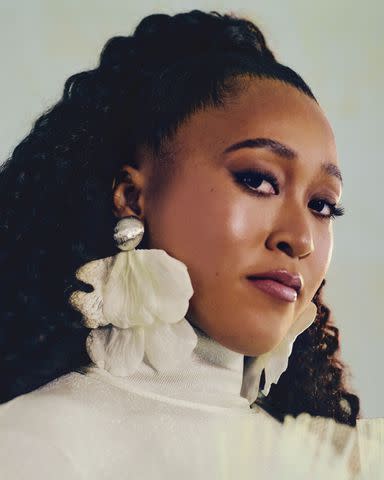
Joshua Kissi
Adeam top and skirt, Fendi turtleneck, and Karo Karu earrings.On a recent Saturday, Osaka arrived to a meeting with her business team at the same rental house in the San Fernando Valley neighborhood where she practices daily. Each of her entrepreneurial endeavors were represented in one room. Osaka answered questions from the group. Duguid sat across from her, hosting the living room chat near a mosaic fireplace and burgundy floral rug, upon which Osaka does her daily stretches. Duguid had also given birth recently, to her second child just two weeks prior. “What so far has been your most favorite thing about being a mom?” Duguid asked Osaka, who sipped a boba drink, wearing a cacao-colored fleece Nike crew neck sweatshirt emblazoned with “Naomi Treats.”
“She is so pure,” Osaka said of Shai, “like, every time she sees me, no matter what, she'll smile. And she's going in the phase now that she'll kind of reach out her arms a little bit.”
“And your least favorite?”
“She gets hangry,” Osaka said, smiling. “And she has levels.” Osaka scrunched her face and imitated her daughter. That, and “she has explosions in her diaper.”
When it comes to new moms, “Do you have a piece of advice?” Duguid asked. Osaka replied: “I don't think there's any right way to do specific things.”

For Shai, Osaka is creating their own family traditions. “It's really important for Shai to know her bloodline and where she came from,” Osaka tells me. “I'm a big culture person, so I always love to celebrate. I want Shai to learn Japanese,” she says, Osaka’s first language.
Osaka remembers how, growing up, her family didn’t really celebrate Thanksgiving—though her mom did prepare miso turkey. Her dad’s side of the family cooked traditional Haitian dishes. Osaka has recently expanded her own culinary skills to include recipes that Cordae’s mom taught her: southern-influenced foods like mac and cheese and sweet potato casserole.
Christmas was a different story. Her family loved gift-giving and always marked the holiday, even though they were often on the road during that season. This year, Osaka will be in Australia for Christmas, but she plans to instill a tradition of taking photos of Shai dressed up on each holiday. She hopes her daughter will one day take up a sport, because that is what taught Osaka discipline and gave her a work ethic. She wants to share those values with Shai. She wants, especially, to teach her to be grateful and kind.
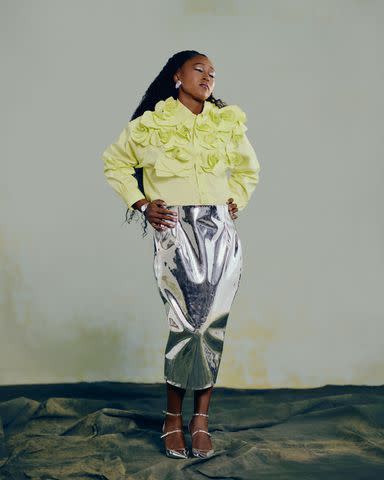
Joshua Kissi
AKNVAS top and skirt, Leigh Miller earrings, Tag Heuer watch, and Larroude shoes.Osaka admits she spent the first weeks of motherhood worrying whether or not she would be a good enough mom, but then something clicked. “Moms are superheroes,” she says, “but they're also people.” Osaka thinks of her own mom. Her family moved from Japan to the U.S. when Osaka was three. Tamaki Osaka devoted herself to raising her two daughters, a year and a half apart in age. “Growing up, I've always seen her being so independent and so strong, but now that I'm thinking about it, she must have been really worried all the time,” says Osaka. Tamaki worked overtime in the import and export industry in New York, sometimes sleeping in her car. Osaka has admitted that she practiced tennis so intensely back then because she wanted her mom to not have to work so hard. “I just can't imagine how stressful it was,” Osaka tells me. “She was the type that did everything for me and my sister,” Osaka says. “I feel like, in that way, she sort of lost, like: What does she like to do? And what does she want to do in the future?”
These days, Osaka wakes up around 5 a.m. She feeds Shai and listens to her babble, which she does a lot lately. Osaka has hope for Gen Z and those that follow, those who are protesting and publicly taking up causes they believe in. They inspire her, and she wants to pass that courage and promise onto Shai. “I want her to stand up for what she believes in,” Osaka says. “I think that there's a lot of power in someone's voice. Judging from how much [Shai] likes to do her little talking, I guess she's also going to be a vocal kid.”
Parenting with Cordae has been easy so far. “We built a really good foundation,” she says. “I don't know if it's because he's just an easygoing guy, but I think we just respect each other's opinions. And if we disagree on something, we talk it out. At the end of the day, we both want what's best for Shai.” Often, Osaka looks at her daughter, and thinks: Somehow it feels like you grew so much taller than when I saw you last. At four months old, she already has bottom teeth. “Looking into Shai’s eyes and holding her I always think, Wow this little person depends on me so much, I have to do better,” Osaka wrote in a social media note recently. “It’s such a strange feeling watching your kid grow.”
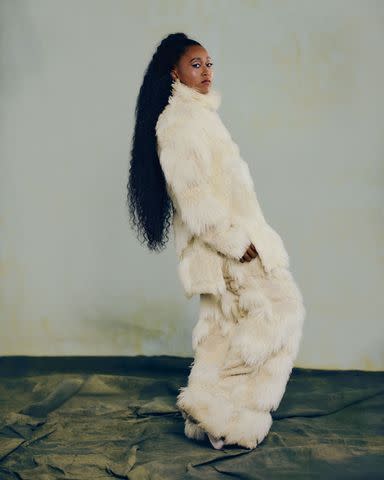
Joshua Kissi
A.Potts top and pants and Nike socks and shoes.By mid-morning, Osaka is onto her workout. She starts with cardio, running or biking for about 30 minutes, before stretching, then playing tennis for two or more hours. She ends at the gym with strength training or a massage, before returning home to spend more time with Shai. Her coach says she puts in at least six hours of training and treatments a day, as well as time devoted to her businesses. “Then it's Shai time, and she has Sunday that is fully committed to her daughter,” Fissette says. “Having Shai in her life, I think that also made her realize that she really needs to use every minute she has.”
On another afternoon when I visit, Osaka is in the zone, lunging at tennis balls, shoes squeaking across the court. After going through pregnancy, Osaka says she was surprised at how her body felt unstable, her joints fragile, her core loose. She has put a lot of work into rebuilding her body and her power. She doesn’t get tired so easily anymore. On this day, Osaka is full of energy. “Honestly,” she tells me, “I feel pretty good.”
Shortly after her birthday, Osaka wrote online in English and Japanese: “I’m so grateful to have another year.” Life, she has learned, is precious, and far too short to waste any moments. “Time is ticking,” her coach says. “She wants, of course, to be ready in January,” and she puts this pressure on herself: “It is,” he says, “a clear sign of a champion.”
On the court, Osaka cranks up her playlist; Mariah Carey’s “Always Be My Baby” and Miguel’s “Sure Thing” reverberate through the speakers. Osaka practices her stroke. “I felt something different, can we just hit one more on this side?” Osaka asks. “I need to see if I can figure it out.”
It’s past noon and her usual practice time is over, but Osaka decides she wants to keep going. “That felt better,” she says. “Can we do that one more time?” Osaka swings her racquet again. Another hour passes. She is not done yet.
Credits
Photographer:
Joshua Kissi
Stylist:
Sue Choi
Makeup Artist:
Sir John
Hair Stylist:
Artavia Harris
Nails:
Emi Kudo
Tailor:
Hasmik Kourinian
Set Designer:
Amy Jo Diaz
Booking:
Talent Connect Group
For more InStyle news, make sure to sign up for our newsletter!
Read the original article on InStyle.

